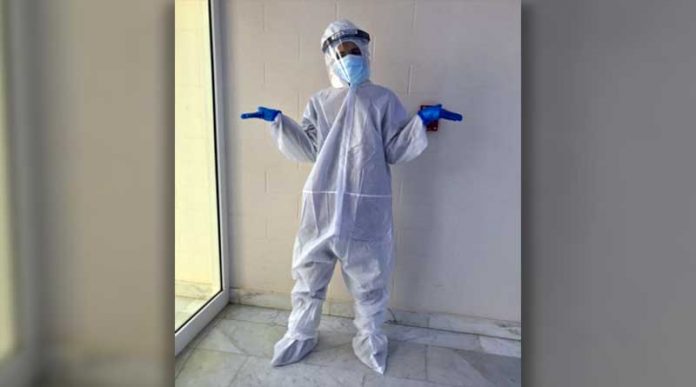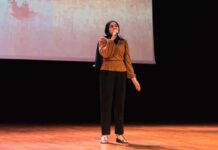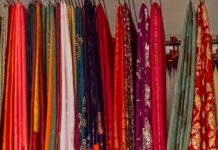Hira Ejaz, who once carried the expectations of her family to become a doctor, found her way through the medical industry during the COVID-19 pandemic and hasn’t stopped saving lives to look back since.
By Zahra Rashid
Dubai
It was 2 a.m. when she got the call.
The only reason she heard it was because it was the middle of Ramadan, a special Islamic month in which it is a ritual to stay awake till sunrise. Unknown caller ID was all she could see when she looked at her phone.
Wondering whether she should pick up the call, she thought “what if it’s an emergency?”
With that, she swiped right and put the phone next to her ear.
It was the words she heard from the other side of the call that changed the course of her life.
In the next 24 hours, Hira Ejaz packed a suitcase, said goodbye to her family and travelled by taxi from Sharjah to a remote area in Abu Dhabi. In the middle of this desert was a make shift COVID-19 hospital where she would be, for the first time in her life, considered a doctor.
“I can still remember the day I left so clearly,” she said.
May 18, 2020. She had recently lost her job; COVID cases were on the rise and there were country wide curfews at night. She remembers hearing many stories of frontline healthcare workers dying from the virus, which is why she hesitated when she heard the offer being presented to her during that call.
“Basically, I was told that the hospital is looking for a doctor who will be willing to come to Abu Dhabi, wear PPE for long periods of time and work with thousands of COVID-19 positive laborers,” Ejaz recalled.
Her hesitation only lasted mere seconds.
“In that moment, I realized that I had been waiting for four years for a chance to become a doctor and help save lives,” she said.
For her, this was a once in a lifetime opportunity that she simply could not pass up, regardless of all the risks.
In the decade leading up to this day, Ejaz completed a six-year long Bachelor of Medicine and Bachelor of Surgery at the Ras Al Khaimah Medical & Health Sciences University.
“I wasn’t forced to study medicine but it was more of an expectation since none of the other kids in my family had done it. I knew what my future would hold since I was in grade eight,” she explained.
In her first year at university, she felt “like a lost pigeon.” She wasn’t clicking with her classes and was questioning her decision to follow through with her family’s expectations. However, she persevered, and from her second year onwards, she bonded with a group of people who are close friends till today.
“I finally found passion in my work and in my last year, I even received a standing ovation from the deans for my symposium presentation on internal medicine,” she said. It was one of her most gratifying moments a memory she holds close to her heart.
“After all this work and knowing that my parents were so supportive and open-minded, I was disappointed when they told me that I couldn’t do my internship after I graduated.”
The idea of Ejaz working as a doctor was something her parents did not believe in at the time. After two years of continuous convincing, they finally came around, but by that time, it was too late. So, she was left with odd waitressing jobs and being a trainee in the medical insurance industry until the summer of 2020 came around.
“I worked for 16 hours straight on my first shift,” she said.
She started off with consulting, taking swabs and asking for the general history of her patients. She found it all very foreign at first, and the layers of protection she wore left scars on her face that wouldn’t heal for months to come. Nonetheless, she was fascinated by the idea of finally putting her education into practice; nothing else mattered.
After two days, she was moved to a field hospital in Al Ain because they were facing a shortage of doctors. There, she was the only female amongst six male senior-level doctors, and even that didn’t stop her. She had a supportive manager who motivated her and recognized her diligence.
After several months, she was promoted to the position of medical in charge of vaccination, isolation and hotel quarantine in Abu Dhabi.
“I was responsible for 32 teams and 22 centers. The only thing that kept me going was the four years of built-up frustration and energy that was finally being let out to fulfil my dreams.”
However, the day her manager told her she was going to be in charge of an entire hospital slowly turned into “the worst day” of her life.
It was July 5, 2021, when they completed the construction of a new field hospital in Ras Al Khaimah. She was expecting a fully functional ICU with an experienced team under her, but all she was left with were serious cases of COVID-19 and chaos. She doubted herself for the first time that day, but after several panic attacks and pep talks, she got up and kept going. She worked days and nights to structure the operations of the hospital step by step.
Now, eight months later, it is one of the best hospitals in the country with over a thousand recoveries and one of the lowest mortality rates.
“Each patient had their own story and it was a privilege to help them physically and emotionally through their pain. I remember so many by name and I’m sure they remember me too.”
This hospital was also where she saw, for the first time, one of her patients die from the virus.
The patient was a 92-year-old woman with underlying medical conditions.
“She fought so hard but unfortunately had caught the deadliest variant of COVID, Delta,” Ejaz said. There was no time to even think about her emotions after that because the hospital was overflowing with more patients.
“Eventually I realized that after a death, there are always more lives to save.”
This mind-set helped her remain resilient through the grief.
For Ejaz, her job as a frontline worker was a blessing in disguise. It gave her a will to live and to believe in herself as well as allowed her to provide financial help to her family at a time of despair.
“But now, people are calling it the endemic,” she said.
As COVID cases decrease in the UAE and hospital beds begin to empty, Ejaz cannot help but feel bittersweet. She’s delighted, but also left unsure of her own future.
The world may be going back to normal, but the pandemic became her normal and she doesn’t know how to keep going without it.


















